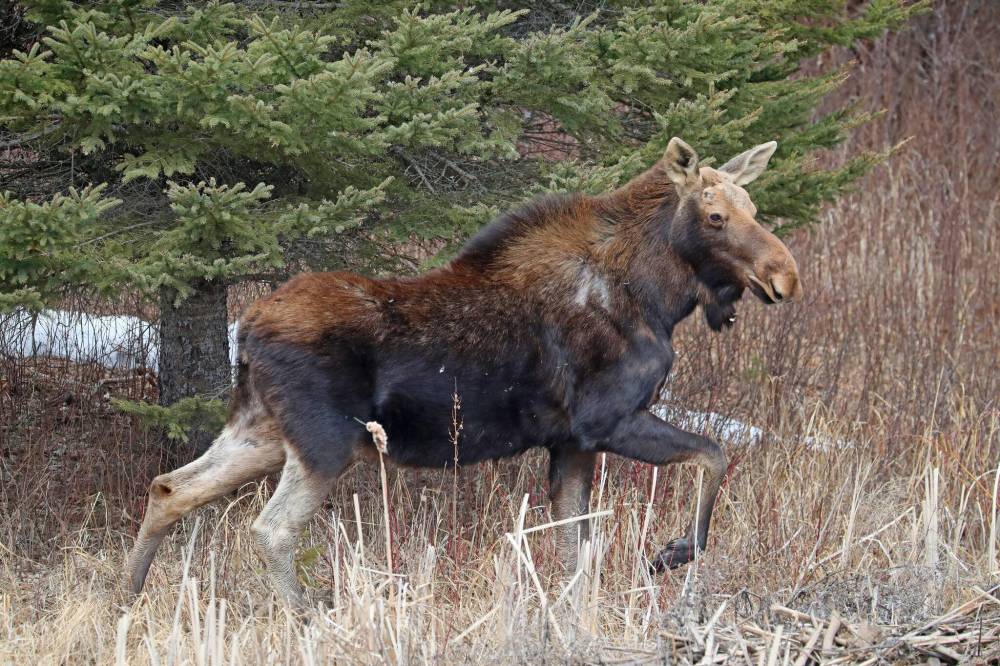A northern Manitoba First Nation has asked the Court of King’s Bench to cancel all licences permitting non-Indigenous moose hunting licences on its territory this fall.
The injunction filed in court Monday by Pimicikamak Okimawin (Cross Lake) wants the court to enforce its treaty and Northern Flood Agreement rights giving the community top priority to hunt for food, and to cancel moose tags issued by the province last month for hunting on their traditional lands.
“They’ve violated and breached the agreement and they should be living up to it,” said Chief David Monias, explaining that the Crown broke promises in Treaty 5 and the Northern Flood Agreement that lay at the heart of Manitoba’s ability to develop hydroelectric power, forestry and mining.

TIM SMITH / THE BRANDON SUN FILES
Pimicikamak Okimawin (Cross Lake) relies on harvesting moose for sustenance and has seen the moose population decline, said Chief David Monias.
The treaty promised to protect Pimicikamak’s right to feed community families by hunting moose in their area and now the moose populations are at risk, Monias said.
“I think it’s about time now where we say enough is enough,” said the leader of the First Nation that, for years, has raised concerns about Manitoba not living up to the Northern Flood Agreement.
Community members have protested outside the Manitoba Hydro building in Winnipeg, at the Jenpeg generating station close to the First Nation, and travelled to hydro export markets in Minnesota and elsewhere in the U.S., and the United Nations to get the word out, but nothing has changed, Monias said.
Now that Indigenous reconciliation is getting more media attention and Manitoba has Wab Kinew, its first First Nation premier, vowing to make it a priority, Pimicikamak officials hope their concerns will be addressed.
“If you’re true to being in a good relationship with Indigenous people by signing agreements, you must enforce and implement that agreement,” Monias told the Free Press Monday.
The chief cited a section of the NFA that says the province cannot issue licences or permits for hunting and fishing in the area without meeting with First Nation officials and receiving their expressed permission.
“We have to make sure we’re at the table,” said Monias, adding he said he hopes the court action gets the provincial government’s attention and a commitment to meet.
He said he received a call from Natural Resources Minister Jamie Moses Friday suggesting that the province may not issue any moose tags to non-Indigenous hunters next year.
But that’s no reassurance to his community that relies on harvesting moose for sustenance and has seen the moose population in decline as a result of hydroelectric dam development and operations, Monias said.
“I understand that the Manitoba government has an obligation to all Manitobans. We feel we do, as well, which is why we signed the Northern Flood Agreement,” he said.
“It provides electricity to all Manitobans and it provides revenue to Manitoba, which we don’t have a share in, and we deserve a share in the revenue. People need to be respected. Respect the Northern Flood Agreement and Treaty 5 and we can have a good, meaningful relationship.”
Moses said Monday that he can’t comment on the injunction because it is before the court, but added that the provincial government is one that listens.
He said he that looks forward to meeting with Monias and other Pimicikamak leaders, as well as the Manitoba Wildlife Federation.
The MWF, a hunting advocacy organization, went to court earlier this month over the province’s decision to reduce the number of moose tags issued to non-Indigenous hunters for the upcoming season.
“The MWF has long been advocating for a shared management approach that is based on the best principles of wildlife management and has proper regard for all Manitobans’ right to hunt,” managing director Carly Deacon said Monday.
The federation has asked the Court of King’s Bench for a judicial review of the government’s decision to issue a maximum of 100 licences for moose hunting in four northern game areas after first indicating 400 licences would be available in the fall.
Deacon said the the organization was reviewing Pimicikamak’s application Monday and couldn’t comment. She said the application by the First Nation for an injunction and her federation’s application for a judicial review show that both sides are seeking a resolution that the province can’t or won’t provide.
“The current state of affairs clearly demonstrates the flaws in the government’s approach to date,” she said. “We are hopeful that the current legal challenges will lead to a more fair and sustainable approach in the future.”
carol.sanders@freepress.mb.ca

Carol Sanders
Legislature reporter
Carol Sanders is a reporter at the Free Press legislature bureau. The former general assignment reporter and copy editor joined the paper in 1997. Read more about Carol.
Every piece of reporting Carol produces is reviewed by an editing team before it is posted online or published in print — part of the Free Press‘s tradition, since 1872, of producing reliable independent journalism. Read more about Free Press’s history and mandate, and learn how our newsroom operates.
Our newsroom depends on a growing audience of readers to power our journalism. If you are not a paid reader, please consider becoming a subscriber.
Our newsroom depends on its audience of readers to power our journalism. Thank you for your support.